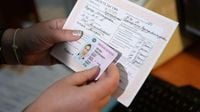As of April 1, 2025, foreign driver's licenses are no longer valid in Russia, a change that has significant implications for foreign nationals living in the country. This new regulation mandates that anyone who has obtained Russian citizenship, a residence permit, or a temporary residence permit must replace their foreign driver's license with a Russian one within a year of receiving their new status.
According to Irina Volk, an official representative of the Ministry of Internal Affairs of Russia, "Foreign national and international driver's licenses are recognized as invalid in Russia after one year from the date of receipt by a foreigner of a residence permit or citizenship of the Russian Federation." This law aims to streamline the driving regulations and ensure that all drivers in Russia are properly licensed.
For those caught driving with an invalid license, the penalties are steep. Offenders may face fines up to 15,000 rubles and can be temporarily barred from driving until they rectify their licensing status. The Ministry of Internal Affairs reported that nearly 500,000 individuals have exchanged their foreign driver's licenses for Russian ones in a simplified process before the deadline.
This new rule is particularly relevant for foreign nationals who received their residence permits or citizenship before April 1, 2024. They must act swiftly to comply, as their foreign licenses will no longer be recognized. The same applies to Russian citizens who acquired their licenses abroad.
In Kazan, the local State Traffic Inspectorate has experienced a surge in demand as foreign nationals rush to comply with the new regulations. Mikhail Savin, the head of the Inspectorate, noted that the influx of applications has "overloaded the work" of the agency. Many migrants have taken the requirements seriously, ensuring they secure their Russian licenses.
For drivers who need to exchange their foreign licenses, the process varies based on the vehicle categories they wish to operate. Those looking to drive light vehicles, motorcycles, or mopeds only need to pass a theoretical exam. However, for heavier vehicles such as trucks and buses, drivers are required to undergo a full training cycle and pass both theoretical and practical exams.
Interestingly, there are exceptions to these rules. For instance, individuals with driver's licenses issued in Belarus are not required to undergo additional testing to obtain their Russian licenses. This exception extends to both Russian citizens and Belarusians who have received residence permits in Russia.
As the new rules take effect, the government aims to close legal loopholes that have allowed some drivers to evade the necessary medical examinations and testing requirements. Some critics argue that the previous system allowed individuals to drive without proper oversight, potentially endangering public safety.
Moreover, the regulations are designed to eliminate the so-called "gray" market for driver's licenses, which has seen individuals traveling abroad to obtain licenses more easily. According to Yan Khaytser, vice president of the Russian Automobile Union, this trend has posed significant risks, as some foreign licenses may have been acquired without proper medical checks or training.
To further enhance the integrity of the licensing process, all driving schools in Kazan are required to be licensed and meet specific operational standards. Mikhail Savin assured that the region has no "gray" driving schools, with about 68 legitimate institutions currently operating. Last year, licenses of four driving schools that failed to meet necessary requirements were annulled.
The new licensing rules are expected to improve road safety and ensure that all drivers in Russia are adequately trained and assessed. As Savin remarked, "If a person has trained in a legitimate driving school and fulfilled all requirements to obtain a driver's license, I see no difficulties, regardless of where they trained."
In conclusion, as of April 1, 2025, the landscape of driving regulations in Russia has shifted significantly. Foreign nationals and Russian citizens alike must navigate these new requirements to ensure they remain compliant. The Russian government is hopeful that these changes will lead to a more regulated and safer driving environment across the country.









